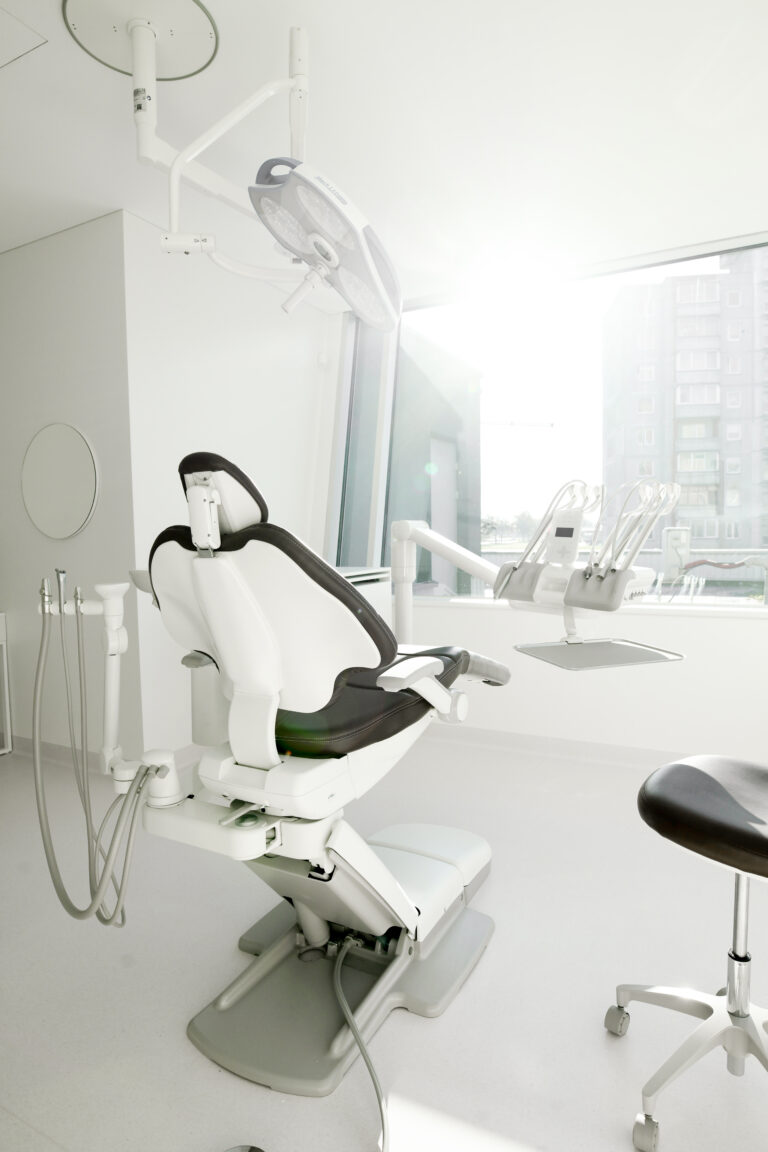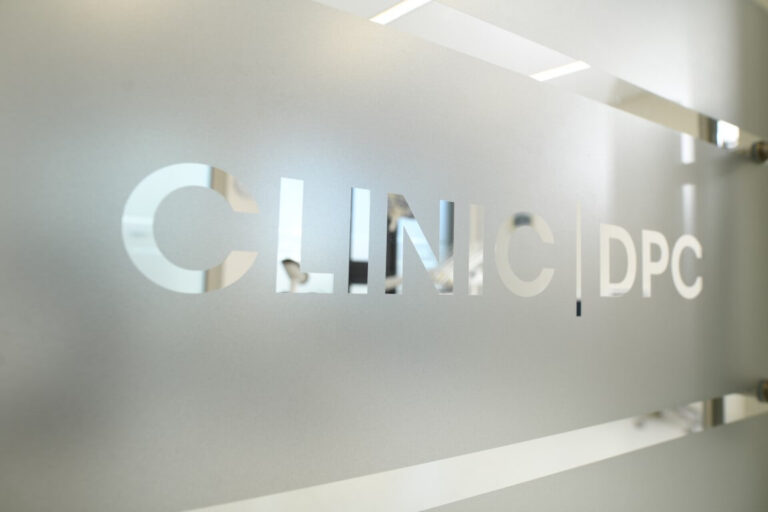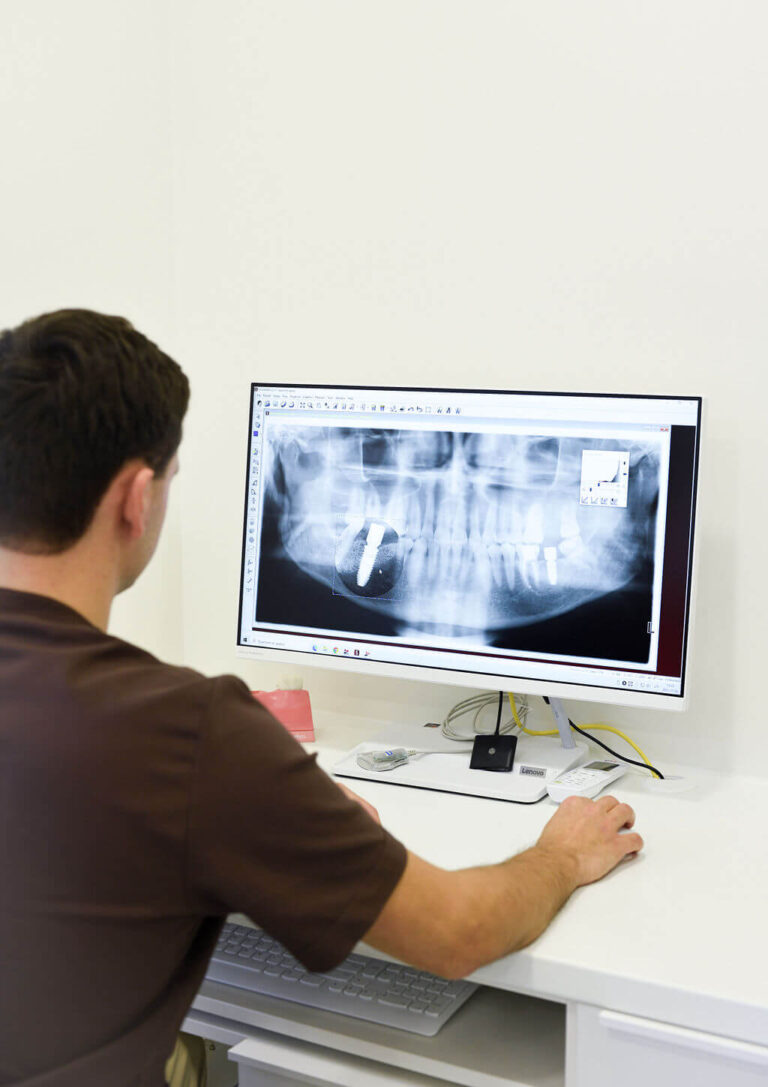Tooth loss is often seen as an aesthetic problem. But in reality, healthy teeth are far more important. Recent scientific research reveals the great importance of oral hygiene for human health. Tooth loss is linked to overweight, digestive diseases and even cancer. People who lose their teeth are more likely to suffer from anxiety and depression. And the leading cause of tooth loss, periodontal disease, is directly linked to Alzheimer’s disease.
Overweight and digestive diseases
Poor oral hygiene and tooth loss can contribute to the development of chronic gastrointestinal diseases and even stomach and esophageal cancer. This is supported by studies in different countries and summarized in a meta-analysis by Chinese researchers, which looked at 25 different studies with more than 1 million participants from 11 countries. According to the meta-analysis, losing 10 or more teeth increases the risk of stomach cancer by 9% and esophageal cancer by 14%.
Simonas Bankauskas, founder of the CLINIC | DPC network of dental clinics, says that tooth loss and higher cancer risk are linked in several different ways. “The most common cause of tooth loss in adults is periodontal disease. Like any other chronic disease, periodontal disease lowers the body’s resistance and creates a breeding ground for cancer cells. The second main cause of tooth loss is tooth decay. It is caused by poor oral hygiene and a high intake of carbohydrates (especially sweets). Studies have shown that high carbohydrate intake contributes to the development of cancers. A third way in which tooth loss affects the risk of cancer is through bacteria. After tooth loss, bacteria eventually build up in healthy periodontal tissue (gums). If left untreated, this can lead to inflammation, which spreads microbes throughout the body and creates a more favorable environment for cancer,” explains S. Bankauskas.
Tooth loss is also linked to being overweight. The relationship is reciprocal – people who lose their teeth are more likely to become overweight, and those who complain about it are more likely to lose their teeth. “First of all, tooth loss reduces chewing function. People therefore eat less fruit, vegetables and nuts. Soft foods, which are generally more calorific, are more often chosen: muffins, boiled potato products, pasta. Heat treatment and high fat intake help to soften food. All of this contributes to obesity”, says the dentist at CLINIC | DPC. On the other hand, overweight people tend to follow an unhealthy, carbohydrate-rich diet. As a result, they are more likely to suffer from problems such as tooth decay, periodontal disease and tooth loss.
Parodontosis and Alzheimer’s
In 2017, scientists discovered a link between inflammation that causes tooth loss and Alzheimer’s disease. It was found that chronic periodontitis increases the risk of developing Alzheimer’s by 70%. This has been confirmed by recent scientific studies showing that microbes from the human mouth can travel throughout the body and eventually even reach the brain.
Stephen Dominy, a doctor in the US, conducted an experiment on mice to determine how inflammation in the gums of rodents develops into a disease similar to Alzheimer’s. Untreated periodontal disease has exactly the same effect in humans. The inflammatory bacteria Porphyromonas gingvinalis is able to break through the blood-brain barrier and enter the human brain through the bloodstream. There, the bacteria destroy healthy nerve cells. Eventually, this attack develops into Alzheimer’s disease.
“Our mouths are a real battleground for good and bad bacteria. If we neglect our oral hygiene and don’t take care of our teeth, the bad bacteria get the upper hand. Now we can see that tiny micro-organisms we never thought of before can cause incurable diseases. This makes oral hygiene even more important for our health. Preventing periodontal disease, tooth decay and other dental diseases and loss is very simple – by having professional oral hygiene at the intervals recommended by your doctor and by taking care of your oral hygiene at home,” points out Dr. Simonas Bankauskas.
Emotional and psychological challenges
A healthy and beautiful smile is a person’s calling card. For young and old alike, yellowing, crooked or missing teeth cause emotional and psychological challenges. Numerous studies have shown that tooth loss has a strong correlation with lower self-esteem, anxiety and even depression. “People who lose their teeth tend to have complex feelings, avoid smiling, and may even begin to isolate themselves from others. This has a very negative impact on quality of life. This situation, which lasts for a long time, has a crushing effect on a person and causes depressive emotions,” explains S. Bankauskas, implant dentist at CLINIC | DPC.
A study conducted by the American Dental Research Association with over 450,000 respondents revealed a clear link between tooth loss and the development of anxiety and depression. Respondents who had lost teeth were much more likely to suffer from anxiety disorders and had a higher incidence of diagnosed depression. This connection was equally strong among both younger and older respondents.
A healthy and beautiful smile is therefore very much linked to a person’s quality of life, their emotional and psychological well-being. And we must always take care of our oral hygiene and dental health, not just when we feel pain or other symptoms.
Why choose CLINIC | DPC
Over eleven years of operation, more than 30,000 implantations have been performed in the clinics, allowing doctors to confidently share their experience and recommendations. Implantologist and clinic founder Simonas Bankauskas, who has amassed a vast wealth of theoretical and practical knowledge in dental implantation that cannot be acquired at any university, passes on his expertise to colleagues. He frequently visits CLINIC | DPC clinics, which are located not only throughout Lithuania but also in London. The doctors also conduct various free seminars and online conferences for patients.
At CLINIC | DPC centers, you can purchase dental services under especially favorable “SB Lizingas” terms – the first 12 months come with no additional fees! It’s understandable that dental procedures can sometimes be a significant financial challenge, but investing in your health always pays off. Therefore, if needed, you can take advantage of this partner offer and obtain the necessary services through an installment plan.
The network of clinics does everything possible to ensure that their patients are not only healthy, but also financially secure. CLINIC | DPC clinics can be paid with a health insurance card. If you have a sufficient balance for your oral treatment, you can use your insurance card to pay less for the procedure. This is a good opportunity to save money and get the oral treatments you need. The cost of dentures is also reimbursed with the first notification from the Compulsory Health Insurance that the person has been placed on a waiting list. Patients don’t have to wait – they can smile big today, just register and come to the clinic with their first letter.
If you are worried, CLINIC | DPC reminds you that the staff of the clinics are doing everything to ensure your safety – the premises are ventilated, disinfectant liquids and wipes are available in the clinics in accessible places, and handles and other surfaces are disinfected regularly.
If you feel anxious, you are welcome to consult remotely and reduce the amount of close contact. If you have a panoramic photo, we will draw up a detailed treatment plan, schedule treatment visits, try to do as much as possible in one visit, and all you have to do is come straight to the dentist’s chair!





